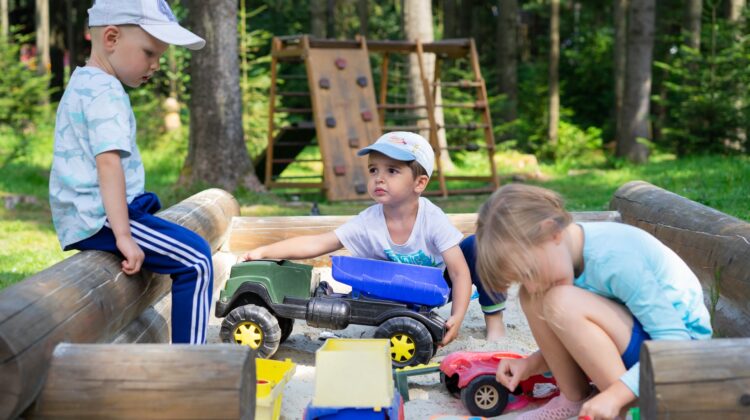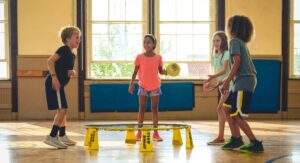
Kids learn to play quite early in life. In the course of play, kids begin to intermingle with each other and develop essential skills in life. Play is necessary for the overall development of the child, physically, emotionally, and socially. It is a natural way to remain active and be happy. The benefits of play for child development are many, and we cannot emphasize enough.
Active play fosters healthy development in kids. They have to be given free play opportunities from birth till teenagers. It helps kids have good physical and mental health and to become more confident when they grow up.
The article will give an insight into various developments that help shape a child’s character.
1. Physical Development

Energetic kids engaged in playful activities have good physical growth. Their balance abilities make progress. Playing various sports and games helps in developing motor skills like crawling, walking, or lifting toys from the floor effectively.
A kid indulging in play appears to be healthier and thinner than a child that avoids recreational activities. There is a chance that the lazy child will probably lead a sedentary life when he grows up.
2. Better Eating and Sleeping Habits
Kids engaged in vigorous physical activities have reduced physical aggression. Engaging in energetic play helps children to use their energy. They have enhanced eating and sleeping habits. Thus, kids feel more rested and refreshed to start a new day.
3. Sound Fitness
Through play, children acquire good physical fitness as they grow into adults. They develop stamina and agility to boost their energy. They can work harder in their professions and are successful as adults.
4. Coordination Abilities
As kids play together, they learn to coordinate with each other. Adjustment is vital for any game to succeed, and the kids understand to cope with each other at a very early age.
5. Social Development
One of the most important benefits of play for child development is the boost of social skills. Kids playing together during childhood days makes it easier to understand each other and agree to group dynamics.
Good social skills are significant for interactions and academic success. A child’s academic performance can be foreseen by his social skills in his lower grades. It is also commonly found that kids who have more recess time behave better in school than those who have less.
6. Share and Care

Through play, kids learn how to interact and adjust with others and learn how to react to others’ feelings. They understand how to share and care for each other. They learn how to put an end to quarrels and stick to the rules.
Kids learn the tasks and systems of society through play and realize the importance of social interactions.
7. Increases Self-esteem
The self-esteem of children grows when they begin to play with other neighboring kids in the area. Kids gain a lot of confidence over some time. Play helps them to gain a sense of self-worth and self-respect.
8. Encourages Imagination
Freely chosen play inspires a child’s imagination and ideas. There is no interference of adults. Kids are free to play any character they like. There is an improvement in mental health through unrestrained play.
9. Sense of Self-discipline
Children learn how to manage in groups during play. There is a sense of self-discipline and restraint among the kids as they participate in activities together. They pick up how to adjust in groups which is a positive development of social skills.
10. Communication Proficiency
Children hone their communication skills by playing with their friends. They begin to improve their vocabulary by engaging in pretend play and use words in the conversations that they have heard from adults before.
Word-based games help kids to enrich their language and literacy skills. Kids learn to express their thoughts and feelings. Play enhances communication skills and boosts language power when they grow up as adults.
11. Improve Attention
The attention span of kids progresses through play. They learn to focus on things, and their concentration grows. Recreation activities help kids in their academics. They also become more confident in tackling various problems.
12. Cognitive Development
Children develop cognitive skills through play. Kids choose a game and concentrate on it from the beginning to the end. It is a significant part of cognitive control. Through play, they learn how to make decisions and plan things and focus for long periods.
13. Assessment Skills
The analytical power and evaluation abilities of children are challenged if any difficulty arises during play. They learn how to find a solution. They hone their critical thinking skills through play like puzzles and riddles.
14. Brain Development
When the child begins to walk, he learns how to explore things and physical spaces. It stimulates his brain by learning to recognize sights and sounds. Play activates brain development which is beneficial for the kid.
15. Creative Approach
Play helps to enhance creativity in kids. In today’s competitive world, creativity helps in steering complex situations successfully.
Play provides an outlet for children to dream big and enact them. It helps kids to create a world that they can be in command. While participating in group games or arts and craft activities, kids come up with innovative solutions and imaginative ideas. They learn to discover new options. Play helps a child to be more inventive and unique. Thus, it proves to be quite advantageous for the kid when he grows up.
16. Develop Curiosity
A sense of inquisitiveness develops as the kids begin to play. Even a toddler attempts to explore every corner of the house. Arousing curiosity among children is the most positive aspect of play. Children learn to be more analytical, reasonable, and logical in their approach.
17. Emotional Growth
Play helps kids to deal with various emotions. Through play, they can express feelings like fear, aggression, rage, resentment, and disappointments. Kids also get a great chance to practice sympathy and thoughtfulness.
In the course of play, kids can express their ideas and emotions. It enhances their confidence and observation. Kids get a sense of achievement and satisfaction.
18. Managing Emotions
Play helps children to imagine a world, characters, and scenarios that equals their emotional state. It helps them to control their feelings.
Play also enables kids to express various emotions that assist them in managing their emotions.
19. Explore Feelings
Kids explore their feelings through play. They know how to express themselves in any situation. It helps them to develop their social skills positively.
20. Gain Independence
Children gain confidence through free play. They learn to respect their freedom and positively use them. It helps them when they grow up as adults.
21. Negotiation Skills
Children learn negotiation skills through play. They understand how to intervene and reconcile with their friends. The appeasement skills immensely help kids when they grow into adults.
As seen above, unstructured freely chosen play helps kids tremendously in many ways. The skills developed during childhood days benefit kids as they grow up. Outdoor activity is important for healthy brain development. Through play, kids learn to cooperate, work together and engage with the world and that is the greatest advantage of play!
In this article, I tried to put forward all the benefits of play for child development. Hope you found them useful. Please leave your valuable insights in the comments!
Leave a Reply